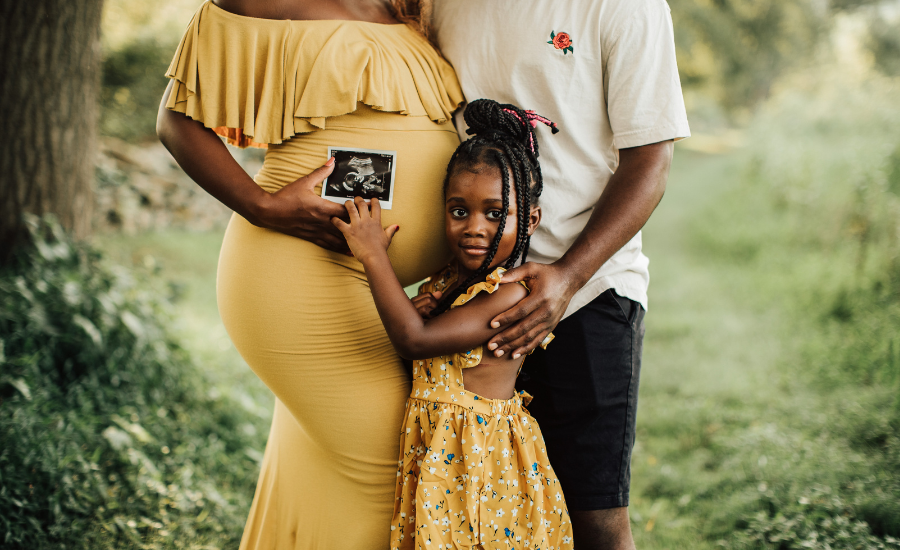Facing the Black Maternal Health Crisis with Faith, Knowledge, and Community
Black mothers in America are facing a life-threatening crisis—but faith, knowledge, and community are powerful tools in the fight for justice and wellness. EEW Magazine is empowering Black women to navigate pregnancy with both wisdom and divine strength.
Written By Tamela Lewis // EEW Magazine Online
When Angela discovered she was pregnant, her heart swelled with joy, but fear soon followed.
She had heard the sobering statistics: Black women in America are three to four times more likely to die from pregnancy-related causes than white women, a disparity that has persisted for decades.
According to the Centers for Disease Control and Prevention (CDC), this crisis remains urgent in 2025.
Angela knew the stories of friends and family whose voices were ignored, whose pain was dismissed, and whose questions went unanswered in doctor’s offices.
Months before discovering her own pregnancy, one of Angela’s closest cousins experienced the horrific devastation of stillbirth.
Yet, she prayed over her unborn baby and believed God was with her. Even so, fear lingered.
Angela's heart overflowed with gratitude when she finally cradled her healthy baby girl by God's grace, yet she carried the weight of knowing that not everyone shares this joy.
For Black women, the maternal health crisis is more than a medical issue. It’s a justice issue. A faith issue. A call for community action. Addressing it means dismantling broken systems while lifting up every Black woman who carries life into the world.
“Black women, regardless of socioeconomic status, face elevated risks of complications.”
The Reality We Face
The numbers are stark. In 2023, the maternal mortality rate for Black women was 50.3 deaths per 100,000 live births, compared to 14.5 for white women, 12.4 for Hispanic women, and 10.7 for Asian women.
These disparities are not solely linked to income or education. Black women, regardless of socioeconomic status, face elevated risks of complications such as preeclampsia, postpartum hemorrhage, and cardiovascular disease (SOURCE: NIH).
The Causes Are Complex:
Systemic Racism and Implicit Bias: Black women often encounter dismissive or biased treatment from healthcare providers, resulting in delayed or inadequate care.
Limited Access to Quality Care: Barriers like lack of insurance, transportation, or nearby obstetric care disproportionately affect Black women, especially in rural areas.
Generational Health Disparities: Chronic conditions such as hypertension and diabetes are more prevalent, heightening pregnancy risks.
Social Determinants of Health: Factors like housing instability, food insecurity, and economic inequality increase maternal health risks.
More than 80% of pregnancy-related deaths are preventable, making this not only a tragedy but a moral and public health call to action.
Why Faith and Community Matter
For many Black Christian women, faith is not just spiritual, it’s survival. Prayer provides peace, and belief fuels courage. Faith does not ignore the facts; it empowers women to act, trusting in God while embracing the tools and knowledge He provides.
Angela drew strength from prayer but also from preparation. She researched hospitals, knowing that the quality of care can vary widely. She brought her husband and mother to appointments to advocate on her behalf. She joined a church-based support group for expectant mothers where she found a safe space to share fears and prayers.
To face this crisis, we need awareness, action, and faith. Here are tangible steps rooted in spirituality and community:
Educate Yourself and Others: Understand your patient rights. Ask questions. Bring an advocate. Explore CDC resources that empower you to navigate care with confidence.
Demand Accountability: Support policies and providers that prioritize culturally competent care. Back efforts like the Black Maternal Health Caucus, which is fighting to reform healthcare policy.
Find Safe, Supportive Spaces: Engage with church and community groups for emotional, mental, and spiritual support.
Trust God—and Use Resources: Faith and action are not opposites. They are partners. Trust in God’s grace while accessing doulas, mental health professionals, and church or community programs. Stay rooted in His Word, remain prayerful and always hold on to faith.
RECOMMENDED:



